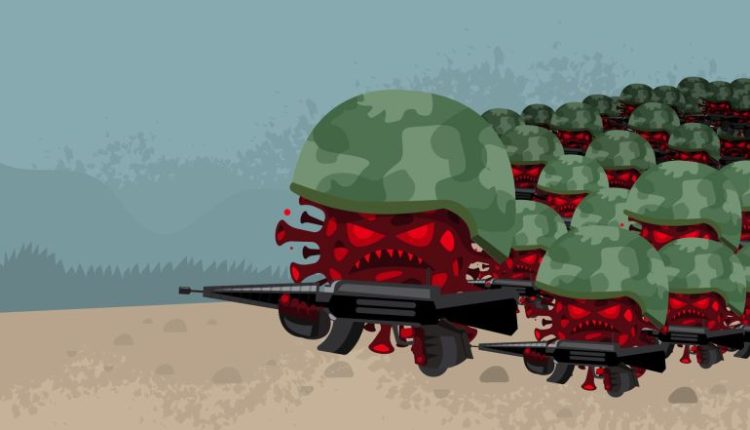World War III Has Begun: Will It Be the End of Civilization

Imane Dernaika Kamali*
In one of his most famous quotes, Albert Einstein asserted, “I know not with what weapons World War III will be fought, but World War IV will be fought with sticks and stones.”
Undoubtedly, Einstein’s chilling prediction serves as a stark reminder of the destructive potential of nuclear weapons, which was first unleashed in World War II, and which changed the thinking of nations and altered existence.
Does this mean that “World War III” will destroy the “entire” earth?
Are we, as Trump stated, “one step away” from a third world war; or has this war already begun?
And if World War II ended with the use of the nuclear weapons , would World War III mark the end of humanity?
History is replete with examples of devastating wars, from Alexander the Great’s conquests in 336 BC, to the Persian-Roman war that lasted about a quarter of a century between 602 and 627, and which was on all fronts of the known world at that time, to the Mongol ‘s invasions, that killed between 45 and 60 million people, which was equivalent to 15% of the world’s population; in addition to the Napoleonic wars and the Crusades and other devastating wars that lasted for many years and killed huge numbers of people. While these wars caused immense atrocities and unprecedented suffering, they did neither eradicate civilization nor ended human existence ; and despite the scale of destruction, these wars proved to be necessary to move history and accelerate it in order to build a new consciousness, new systems, and new thinking; However; none of these wars were “World” wars.
This brings us to the definition of “world war” in today’s world. A world war means that whoever holds the power has the absolute right to shape history to their own desires , with no regard to political, cultural, religious, civilizational particularities, and human rights considerations. It is this power-centric mentality or trend, prevalent in Western culture that led to the First and Second World Wars.
Historical analysis reveals that World War I erupted due to a complex interplay of factors, including colonial ambitions, imperial expansion, and rising tensions between European powers. The assassination of Archduke Franz Ferdinand in 1914 served as a catalyst for the conflict, underlying tensions that had been simmering for years.
The point is that World War I actually begun years before 1914, and it occurred unnecessarily, “solely” for the sake of affirming “power.”
Similarly, World War II which was fueled by a confluence of factors including economic instability, the Great Depression in 1929, and the rising nationalism, began in 1937 in the East between Japan and China, but quickly spread to Europe and beyond. The use of atomic weapons by the United States demonstrated America’s military superiority and marked a turning point in the history of warfare, noting that the atomic bomb used by the United States weighed at that time no more than 17 kilotons for the smaller bomb dropped on Hiroshima, and 21 kilotons for the bomb dropped on Nagasaki, whereas America and Russia possess today more destructive weapons, that far surpass this previous conflict.
John Mearsheimer’s theory of “The Tragedy of Great Power Politics” posits that “ dominant powers, occupying the top seat in the world , actively seek to prevent the rise of “potential challengers”, by never allowing any ‘rising’ power to become a ‘dominant’ power”. This dynamic was evident in the lead-up to both World Wars, as established powers, such as Britain, sought to maintain their dominance.
Thus, we can assert that World War III has “already”started , and that the specter of a third world war looms large, as the world stands on the brink of another major conflict, fueled by escalating tensions, the proliferation of nuclear weapons, and the ongoing pursuit of global power by major nations.
The Russo-Ukrainian war on one hand, and the regional conflict in the Middle East between the resistance in Gaza and Israel on the other, which due to a dangerous escalation, might expand and intensify. Not to forget, the several fronts that have not yet opened; but still represent flashpoints, such as China’s dispute over control of the South China Sea for its geopolitical and geo strategic depth; as well as the East China Sea and the major problem between Japan and China over the Senkaku Islands. Thus, there are scattered fronts ignited around the world, and screens filled with blood, encouraging more conflicts.
Economically, Europe’s economic landscape has been dramatically reshaped by recent events, including the halt of Russian gas exports and increased tensions with China. These factors have contributed to a political shift towards the right in many European countries, echoing the preludes to World War II.
Back to today’s war, it is obvious that it is a war in which each party seeks to prove its power, as Western escalation is met with Russian escalation. For example, while it was previously forbidden for American weapons to strike within Russia, the Pentagon has allowed Ukrainian forces to use American weapons to bomb Russia itself, not just the occupied territories.
Conversely, the “bloc”opposing the West, led by China, North Korea, Iran, and Russia, is becoming increasingly cohesive: Russia has signed a comprehensive strategic agreement with North Korea, and has allied with Vietnam, which was recently visited by US President Biden, in a move seen as being against China.
In addition, most European countries are working to maintain, modernize, renew, and activate their nuclear arsenals. Looking at the “global nuclear map,” we find that Russia possesses 5,980 nuclear warheads, not to mention what America, Britain, France, China, Pakistan, India, and North Korea possess, which means that the world’s nuclear arsenal is vast, with nine countries possessing over 15,000 nuclear warheads, while only 100 nuclear warheads of a single type or 0.2 megatons are capable of devastating a large area, and the use of multiple weapons could lead to a catastrophic destruction followed by a radiation phase that kills hundreds of thousands of people, and then a devastating nuclear winter that completely ends terrestrial existence years, blocking out the sun and forcing any remaining humans to live in distant caves.
Back to the Russo-Ukrainian war, it is clear that the battle is not just about territory between Kyiv and Moscow, but rather a battle between a dominant power and “people” who want the world to remain as it is to serve their strategic interests, and “others”who want to free themselves from colonial influence; with a third party, watching the war from a distance, and wanting it to continue to let America drain more of its weapons, influence, and credibility in the world, and that party is China.
It’s become clear that the Chinese fleet is now larger than the American fleet and that Chinese military industries are superior, more advanced, and more modern than their American counterparts. Undoubtedly, Beijing isn’t building fleets unless there’s a possibility of using them.
Moreover, , by reviewing Russian President Vladimir Putin’s statement that his country must review its ‘nuclear strategy,’ we understand that the use of nuclear weapons for Russia would be when the state is ‘threatened,’ not if the state is actually attacked with nuclear weapons. This means that nuclear weapons are no longer a response to nuclear attacks but rather a response to threats to the state and the regime.
At the end, after reviewing all these scenarios, we can conclude that World War III has already begun: We have mentally entered a war “mood”; and mental possibilities are likely to quickly turn into real possibilities once they are formed mentally.
Thus, the preconditions for war exist, and the trigger moment will be when Russia or Israel uses tactical weapons, which could lead to the use of smaller nuclear weapons, and then things could escalate…
In conclusion, it seems logical to ask:
Who will determine the game of using nuclear weapons?
Who will bear the brunt for the widespread destruction that will befall humanity if these weapons were used?
Are there any political, economic, or strategic gains that outweigh the losses resulting from the use of these weapons, on various levels?
However, the most important question of all remains:
Have those in control of the ‘nuclear buttons’ even considered these questions; or the obsession with dominating the world has become for them more important than the existence of the world itself?”
———————————
* University Instructor- Political Researcher

